- Home
- J. T. Edson
Cure the Texas Fever (A Waxahachie Smith Western--Book 3) Page 7
Cure the Texas Fever (A Waxahachie Smith Western--Book 3) Read online
Page 7
“I’ll take the left side,” Daly stated rather than suggested, nodding to the bushes in the appropriate direction.
“Sure,” Parker agreed, concluding that there was no advantage of additional safety offered by the undergrowth on one side of the trail or the other.
Going their separate ways, but each contriving to keep watching where his companion was positioned, the pair selected routes that offered them a choice of hiding places and an unrestricted field of fire at the wheel-rutted open space between them. Unfortunately, the trail bent in a fashion that prevented either from seeing as far ahead as the stream. However, neither considered this too much of a threat to the success of their ambush. Not only could they hear their intended victim approaching, but the curve also meant that he would have just as limited a range of vision and no such audible guidance to their presence.
Sure enough, even though the pair could not see the rider, the sound of hooves came to their ears. The horses were moving at a steady walk, and soon it was obvious that they had reached the stream. After the horses were allowed to pause and drink, the crossing was carried out in a similar unhurried fashion. However, on reaching dry land, the animals were brought to a halt. Then leather began to creak, and the hired killers concluded that the rider had dismounted.
“Do you reckon he’s stopped to bed down for the night?” Daly hissed after about a minute had elapsed without the approach being resumed.
“He could have,” Parker replied. Aware that the trail was sometimes well used, he went on, “We’d best go take a look. Somebody might come along if we leave it until later.”
“They could at that,” Daly admitted. “Anyways, I wouldn’t fancy trying to sneak up on him through this stuff in the dark.”
Deciding that the undergrowth was much thicker on his side of the trail, which was the reason he had picked it when expecting nothing more than to wait in ambush, the shorter hired killer crossed and joined his companion. Once again employing all the stealth they could manage, they advanced until able to see the stream. What met their gaze came as something of a shock. Although the horses were standing in plain view on the bank, securely hitched to a sturdy sapling, at first neither could locate any sign of their would-be victim. Then the sound of whistling came to their ears. It drew their attention to where the black boots, around which the Nankeen trousers were hanging, showed from beneath and beyond a large and thick bush about the height of a tall man. Jabbing an elbow into Daly’s ribs, Parker pointed with the barrel of his rifle to where the black gunbelt and its staghorn-handled revolver were hanging over a convenient branch.
Both the hired killers drew the same conclusion from what they saw.
Each concluded that their task had been simplified and, in fact, rendered completely safe.
“He’s going to wish he’d took his shit out in the open,” Parker declared sotto voce, raising the Winchester to his right shoulder.
“Yeah,” Daly agreed just as quietly, also bringing up and starting to sight along the barrel of his rifle. Satisfied that the forty-grain powder charge in the cartridges would send the bullets through the foliage and into the concealed man with little loss of velocity, he continued with a savage grin, “The stupid son of a bitch’s got hisself caught with his pants down and no mistake.”
“Stop talking and get the bastard,” the taller hired killer ordered, tightening his right forefinger on the trigger.
Chapter Seven – Where the Hell’s He Gone Now?
In echo to the shot discharged by Monte Parker, Joel Daly opened fire.
Twigs and leaves flew in all directions under the withering hail of lead sent from the muzzles of the two repeaters being operated as fast as the men holding them could work the lever-action mechanisms. Although there was no sound from beyond the bush and the boots still continued to stand with the trousers hanging around them, the blue roan and the bay, whinnying in alarm, showed signs of restlessness. Held by the reins fastened to the saplings, they were prevented from running away despite the fright they had received. However, although they remained in view, the hired killers were too preoccupied to notice that there was something missing from the saddle of the animal the Texan had been riding.
There was no longer a rifle in the saddle boot.
Regardless of there being nothing to suggest such was the case, and convinced that anybody squatting or even standing behind the bush would not have had a chance of being missed by at least some of the lead sent that way, Daly darted forward. He was not only eager to obtain proof of success, but he wanted to have first pick of whatever their victim was carrying. When he peered through the bullet-ruptured foliage, all the color drained from his face.
“Monte!” the hired killer croaked.
“What’s up?” Parker demanded, having followed at a slower pace in case the Texan should still be capable of resistance, and ready to shoot down his companion when satisfied they had carried out their mission successfully.
“Y-y—!” Daly gasped, being so surprised by the discovery he had made that he could not decide upon a positive response to it. “You’d best come and take a look!”
“What the hell’s wrong?” Parker demanded, striding more quickly until alongside his companion. “Anybody’d think you’ve never seen a dead ’n’ af—!”
The words died away as the taller hired killer became aware of what had caused the consternation being shown by his companion.
“The bastard ain’t there!” Daly announced, a statement that was unnecessary as far as the other man was concerned.
“I can see that!” Parker snarled, staring in something close to horror at the unoccupied Nankeen trousers and Wellington leg boots that had helped with what was clearly a well-planned deception. Then his head jerked up and he stared around wildly, exclaiming, “Where the hell’s he got to?”
“Throw those rifles away pronto if you want to stay alive long enough to see two seconds from now!”
Originating at some distance from the bush where the firing had been directed, the order was given in a drawl that proved Daly and Parker were correct in deducing the intended victim was from Texas. The order was uttered before Daly could try to answer the question asked by Parker. What was more, its wording and timbre warned that the speaker was not merely making a polite request backed by a threat he would refrain from putting into effect. Although the broad black gunbelt with the staghorn-handled Colt Civilian Model Peacemaker in its Missouri Skin-Tite holster was still hanging in plain view on the branch, he was sure to be holding the rifle that was no longer in his saddle boot ready for instant use.
A rapid exchange of worried glances passed between the two hired killers. While neither could guess what their fate might be if they surrendered, there was no doubt in their minds over what would happen should they offer resistance. Each was aware that a concerted effort might allow one to locate and shoot the Texan, but was equally certain that it would in all probability be at the cost of the other’s life. Therefore, as neither was willing to make the sacrifice on behalf of his companion and did not doubt the same sentiments applied where the other was concerned, both concluded that they had no other choice and obeyed.
“Now follow them with your gunbelts!” the still-hidden Texan commanded after the Winchester rifles had been tossed aside and without giving either hired killer an opportunity to look around. “Do it real slow and left-handed!”
Yielding to the inevitable, Parker and Daly reached for their gunbelts in the manner demanded by the unseen speaker. While fumbling awkwardly at the buckles, trying to delay the removal as long as possible in the hope that some opportunity to draw the revolver—or, in the case of the shorter of the pair, the hunting knife— would be presented, they heard a rustling of the foliage from the direction in which the voice originated. Slowly turning their heads, they received their first view at close quarters of the man they had been hired to kill.
Under different circumstances, the pair might have found the appearance presented by the Texan inco
ngruous and even amusing. Showing his shortish reddish-brown hair to be naturally wavy, the black Stetson was hanging by its fancy barbiquejo chin strap on his shoulders. He had discarded the coat, and this was not the full extent of his missing garments. Using the trousers and boots to help the deception that had lulled his intended killers into a potentially disastrous sense of false security left him clad below the waist in long-legged red flannel underpants and white woolen socks. However, there was nothing in the least likely to give cause for levity about his grim visage. Rather, it gave a warning that he was ready, willing, and supremely confident he could enforce his wishes as far as the circumstances demanded.
The belief that the would-be victim was armed received instant verification.
Held at shoulder height in hands still covered by black leather gloves, the rifle was directed at a point exactly between Parker and Daly. Nor did either think this was an error on the part of the Texan. They knew that, if required, it could be turned toward one or the other of them with equal facility. Being handled with an ease suggesting competence in its use, it was a weapon of excellent quality. The metal was deep blue as a result of much careful polishing during manufacture, and the woodwork had the patina of best walnut. There was a magazine tube running the full length below the octagonal barrel, but it had only a small wooden foregrip and neither the trigger guard nor loading-lever ring that had characterized the products of the Winchester Repeating Arms Company since their predecessors were sold as the “Volcanic” and the “Henry.” A closer look would have established that it also lacked a trigger.
The pair of hired killers were too filled with consternation over the unanticipated turn of events to notice how the weapon differed from the norm. Even if they had seen the apparent lack of usual fittings, neither would have concluded that it rendered the rifle harmless and intended merely to help carry out a bluff. Each was convinced that the weapon could and would be used with deadly effect at the slightest provocation.
Knowing he would have killed the would-be attackers on the spot but without making his presence known first, Parker did not care for the conclusions he was drawing over being disarmed instead of shot down immediately. Clearly the Texan wanted to take them alive so they could be questioned, and he suspected that the desire for information might lead to using painful methods to extract it. Even if the motive was merely to make them prisoners and—having handed them over to the nearest peace officers—allow the law to take its course, their position might not be a great deal better. The intermediary who had hired them would be disinclined to rely upon their keeping quiet about him voluntarily, and was sufficiently ruthless to take steps to ensure their silence.
Unbuckling his gunbelt while reaching these unpalatable conclusions, Parker saw a possible way out of the dilemma. A quick glance to his left informed him that Daly had not yet duplicated his actions. An equally rapid gaze in the other direction satisfied him that, while there was an element of risk involved, the scheme offered a better chance of survival than allowing himself to be taken prisoner. With the decision reached, he swung and tossed the liberated rig forward, trying to give the impression that his only thought was to surrender.
“Get him, Joel!” Parker yelled the moment he opened his hand.
While speaking, the taller hired killer lunged away from his companion. He hoped that he would cause Daly to react instinctively by trying to draw and that, thinking the discarding of his own handgun made him the lesser threat, the Texan would ignore him for long enough to let him achieve his purpose. Completely indifferent to whether his behavior caused his companion to be killed, he reached out his right hand swiftly to close it around the staghorn grips of the Colt on the gunbelt left behind by their intended victim as additional bait for the trap into which they had fallen.
Bringing the revolver from the Missouri Skin-Tite rig without difficulty and starting to turn toward the Texan, Parker curled his thumb around the hammer and his forefinger entered the trigger guard. On doing so, he made two discoveries that his instincts warned caused the weapon to be very different from any other Colt Peacemaker he had handled. First, the spur of the hammer had been reduced in size, smoothed, and set lower than usual. Second, the forefinger failed to find what he expected to be there. Startled by the realization that the weapon upon which his scheme depended had been modified in such a fashion, he could not prevent himself from hesitating and glancing downward.
The spontaneous actions proved to be the last mistakes of his misspent life.
Having been keeping both men under observation, the Texan had noticed the glances taken by the taller of them. A shrewd judge of human nature, he had already concluded that Daly was the less dangerous. Making a correct deduction of what was being contemplated even as the lunge was commenced, he was swinging the barrel of his weapon in the appropriate direction.
Nor did the absence of a lever and trigger guard prevent the Texan from being able to deal with the situation. While bearing some resemblance to the products of Oliver Winchester’s factory at New Haven, Connecticut, his weapon was a Colt New Lightning Magazine rifle. It had a “trombone” slide action designed from patents taken out by Doctor William H. Elliot, even before having been modified to meet his special needs, and its operation was different from that required by its better-known and much-longer-established competitors in the repeating rifle market.
Before his revolver could be turned upon him, the Texan, aware that the way it was loaded made it even more dangerous than would be a standard type of bullet, proved just how effective the Colt rifle could be in hands as skillful as his own. Instead of moving his right forefinger from where it was curled with its mates around the wrist of the modified “pistol-grip” stock, he gave a sharp thrust forward with his left hand on the foregrip. Although there was no trigger to press, a sharp crack sounded and flame lanced briefly from the muzzle. Propelled by forty grains of prime du Pont black powder, the expelled .44-caliber bullet had the flattened tip that was a necessary safety precaution for use in a magazine tube; a pointed end might cause an accidental detonation if jolted against the percussion cap in the base of the preceding cartridge. This gave the otherwise comparatively low-powered round—which could also be used in the Colt “Frontier” Model Peacemaker revolver without the danger of bursting the metal through overloading—an increased effectiveness over the distance at which it was being used.
Even as the lead passed through Parker’s forehead, emerging at the back of his skull in a spray of splintered bone and pulped brain, the intended victim snapped the foregrip back and forward once more. During the brief interim between the movements a cavity appeared on top of the rifle’s frame to allow the spent cartridge case to be tossed into the air through it before being closed again. While this was happening, apparently of its own volition, the exposed hammer moved to fully cocked and snapped down again. For a second time, the mechanism having replenished the chamber from the magazine tube perhaps even more quickly than would have been possible using a lever-action Winchester, another shot was discharged. It followed its predecessor with a similar accuracy. Although unnecessary, it added to the lethal damage already inflicted and helped throw Parker’s lifeless body over in a backward sprawl. Then, showing the same kind of speed, the Texan caused the second empty case to be ejected as he started to turn his attention to the shorter hired killer. However, despite taking the precaution of aligning the sights, he did not complete the wrist movement required to send off the replacement bullet.
Daly had just finished unbuckling his gunbelt when his companion yelled. Although it was not yet released, and dangled by his side, he realized that he was in no position to respond with the speed his instincts warned were required to handle the latest development. Nor, seeing the deadly and effective speed with which their intended victim was reacting to the threat, did he attempt to carry out the suggested “getting.” Instead, he spun around and, allowing the gunbelt to trail behind him like the tail of a frightened coyote, raced away as fast as
his legs would carry him. Although the rifle was turned in his direction, it did not speak. However, expecting at any moment to feel lead slamming into him, he continued to run at the best speed he could manage through the bushes and trees. He did not slow down until he was halfway up the slope.
Having looked back and, with relief, found there was no sign of the Texan, the surviving hired killer paused just long enough to return the gunbelt to its usual position. Then he resumed the ascent at an only slightly slower pace, repeatedly glancing over his shoulder to satisfy himself that he still was not being pursued. By the time he reached the rim, he was reassured upon this point. Going to where the horses were still standing tethered to the bush, he began to unfasten the reins of his mount and gave thought to his immediate future.
“Try to get me killed so’s you could escape, would you, you stinking son of a bitch?” Joel Daly growled, looking with more anger than revulsion at the body he had uncovered. “Well, it’s you’s got made wolf bait, and I hope you rot in hell!”
Releasing Monte Parker’s horse as well as his own, the hired killer had taken another look to the west and made certain the Texan was not pursuing him. On the point of riding away, being almost broke as the result of a run of bad-luck gambling, he had hoped to improve the situation by returning to Parker. Concluding that he could sell his dead companion’s belongings, he realized there could be another way of obtaining money. Having taken the precaution of learning where the payment would be made before accepting the offer from Parker, but without guessing that the information was supplied only because it was intended that he should not be allowed to live and go there, he would be able to collect the full amount for himself if he completed the task they had tried and failed.
Remaining out of sight beyond the rim, when the once more fully-dressed Texan had come into view, Daly had needed only a single glance to convince him that his notion was fraught with difficulties and danger. Not only was the man riding the blue roan gelding with a noticeably increased wariness, but the repeating rifle was now resting across his knees in a position of instant readiness. It was apparent that, even after nightfall, he would remain constantly on the alert and be even harder to approach undetected than appeared to be the case when they were starting to stalk him. Furthermore, once darkness descended, he would have sufficient knowledge and ability to ensure he was not located. In fact, if he suspected he was being followed, he would be able to take even more effective measures to protect himself.

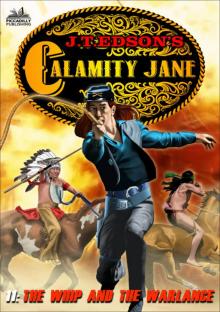 Calamity Jane 11
Calamity Jane 11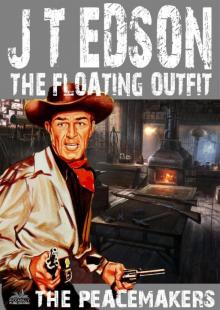 The Floating Outift 33
The Floating Outift 33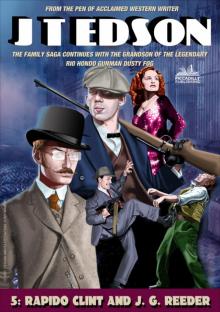 Cap Fog 5
Cap Fog 5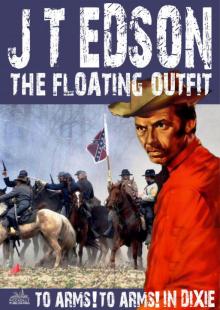 The Floating Outfit 34
The Floating Outfit 34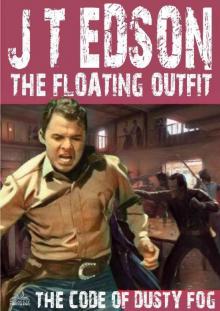 The Code of Dusty Fog
The Code of Dusty Fog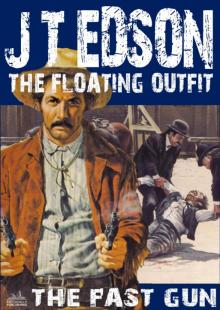 The Floating Outfit 21
The Floating Outfit 21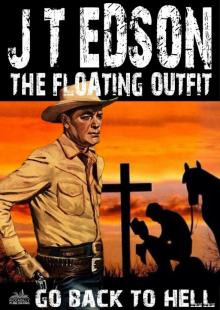 The Floating Outift 36
The Floating Outift 36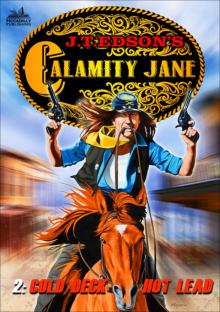 Calamity Jane 2
Calamity Jane 2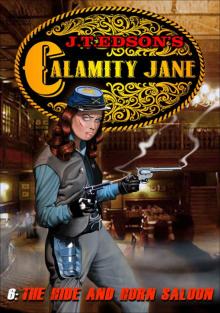 Calamity Jane 6: The Hide and Horn Saloon (A Calamity Jane Western)
Calamity Jane 6: The Hide and Horn Saloon (A Calamity Jane Western)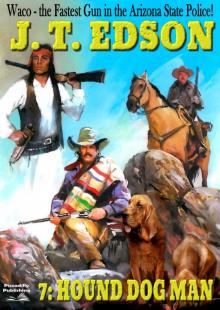 Waco 7
Waco 7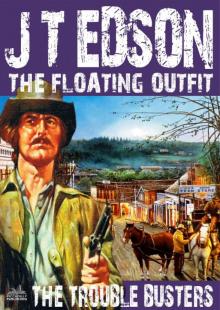 The Floating Outfit 25
The Floating Outfit 25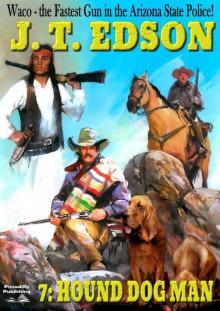 Waco 7: Hound Dog Man (A Waco Western)
Waco 7: Hound Dog Man (A Waco Western)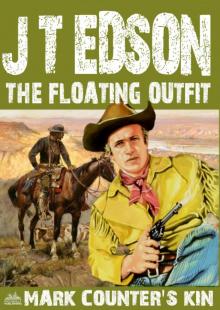 The Floating Outfit 47
The Floating Outfit 47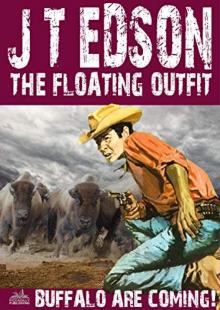 The Floating Outfit 42: Buffalo Are Coming!
The Floating Outfit 42: Buffalo Are Coming!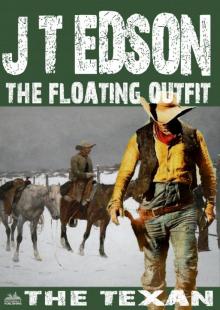 The Floating Outfit 46
The Floating Outfit 46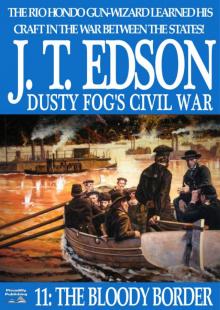 Dusty Fog's Civil War 11
Dusty Fog's Civil War 11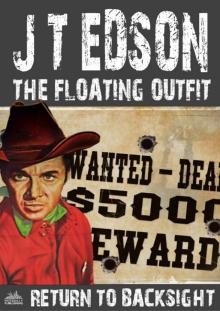 The Floating Outfit 61
The Floating Outfit 61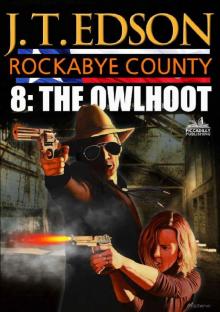 The Owlhoot
The Owlhoot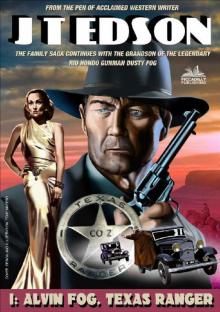 Alvin Fog, Texas Ranger
Alvin Fog, Texas Ranger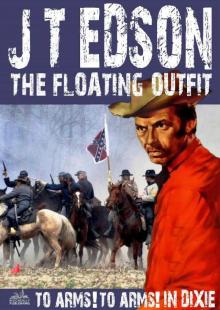 The Floating Outfit 34: To Arms! To Arms! In Dixie! (A Floating Outfit Western)
The Floating Outfit 34: To Arms! To Arms! In Dixie! (A Floating Outfit Western)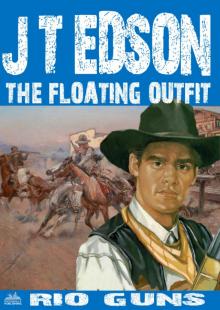 The Floating Outfit 44
The Floating Outfit 44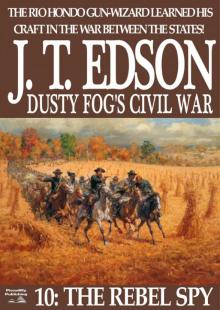 Dusty Fog's Civil War 10
Dusty Fog's Civil War 10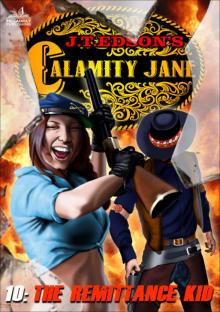 Calamity Jane 10
Calamity Jane 10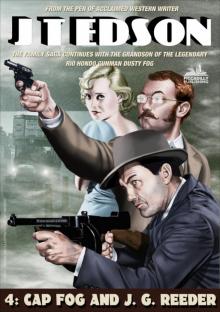 Cap Fog 4
Cap Fog 4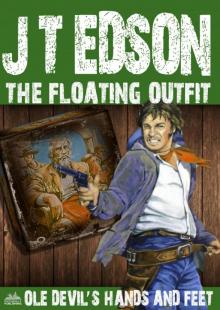 The Floating Outfit 51
The Floating Outfit 51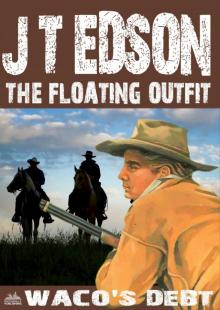 The Floating Outfit 50
The Floating Outfit 50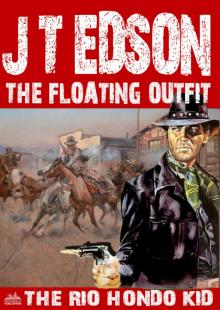 The Floating Outfit 49
The Floating Outfit 49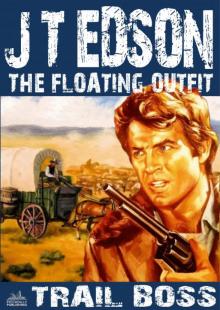 The Floating Outfit 10
The Floating Outfit 10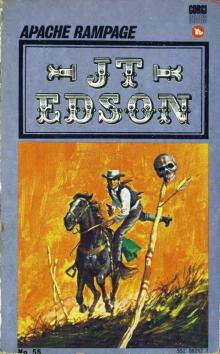 Apache Rampage
Apache Rampage The Floating Outfit 15
The Floating Outfit 15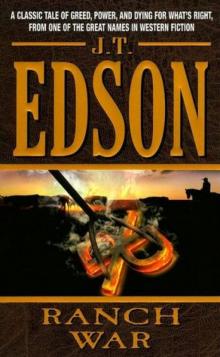 Ranch War
Ranch War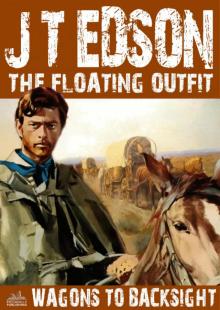 The Floating Outfit 11
The Floating Outfit 11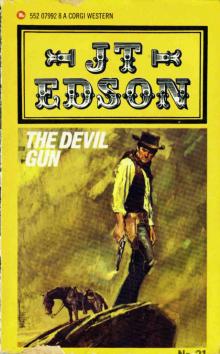 The Devil Gun
The Devil Gun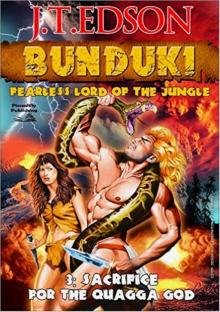 Sacrifice for the Quagga God (A Bunduki Jungle Adventure Book 3)
Sacrifice for the Quagga God (A Bunduki Jungle Adventure Book 3)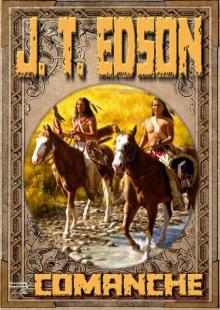 Comanche (A J.T. Edson Western Book 1)
Comanche (A J.T. Edson Western Book 1)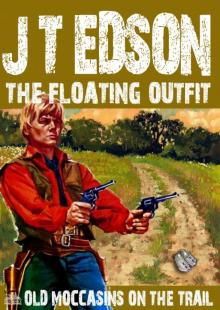 The Floating Outfit 48
The Floating Outfit 48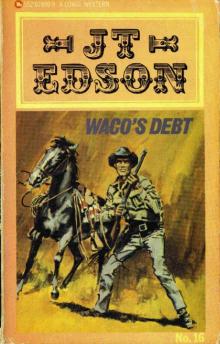 Wacos Debt
Wacos Debt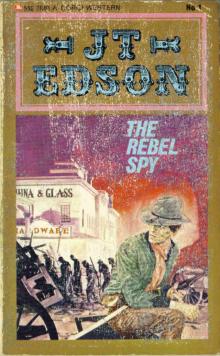 The Rebel Spy
The Rebel Spy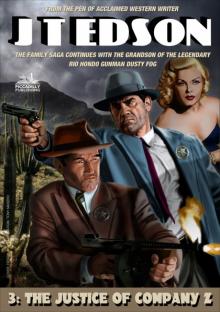 Cap Fog 3
Cap Fog 3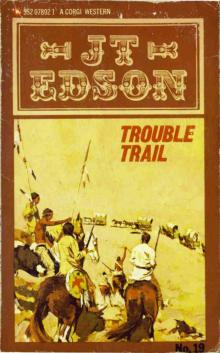 Trouble Trail
Trouble Trail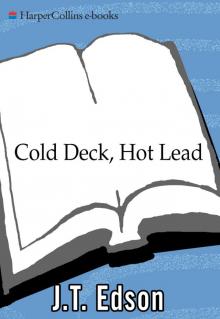 Cold Deck, Hot Lead
Cold Deck, Hot Lead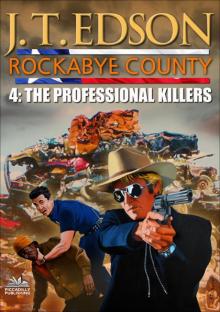 Rockabye County 4
Rockabye County 4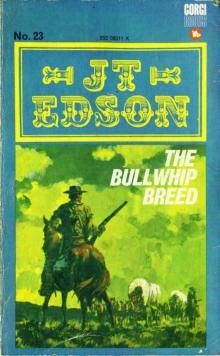 The Bullwhip Breed
The Bullwhip Breed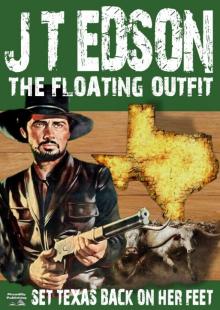 Set Texas Back On Her Feet (A Floating Outfit Western Book 6)
Set Texas Back On Her Feet (A Floating Outfit Western Book 6)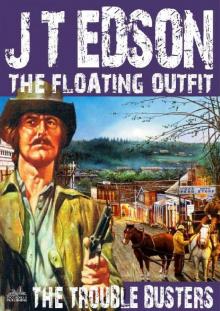 The Floating Outfit 25: The Trouble Busters (A Floating Outfit Western)
The Floating Outfit 25: The Trouble Busters (A Floating Outfit Western)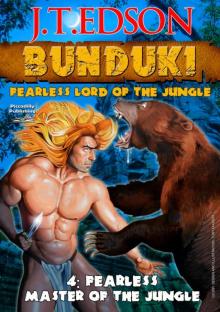 Fearless Master of the Jungle (A Bunduki Jungle Adventure
Fearless Master of the Jungle (A Bunduki Jungle Adventure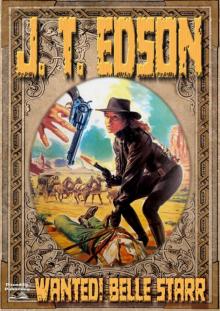 Wanted! Belle Starr!
Wanted! Belle Starr!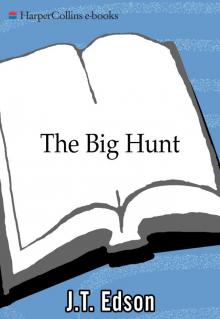 The Big Hunt
The Big Hunt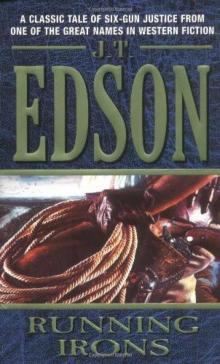 Running Irons
Running Irons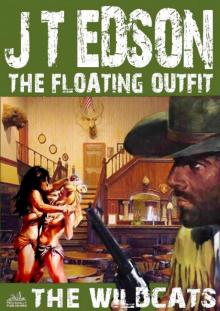 The Floating Outfit 19
The Floating Outfit 19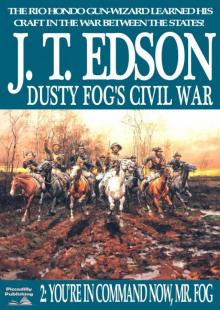 You're in Command Now, Mr Fog
You're in Command Now, Mr Fog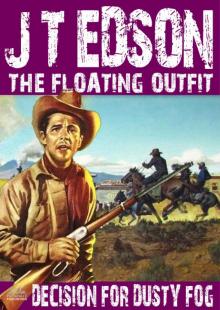 The Floating Outfit 27
The Floating Outfit 27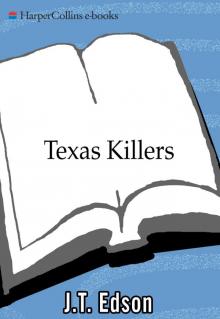 Texas Killers
Texas Killers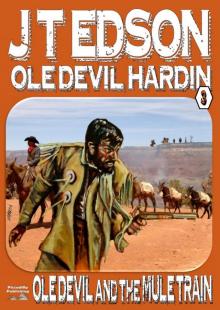 Ole Devil and the Mule Train (An Ole Devil Western Book 3)
Ole Devil and the Mule Train (An Ole Devil Western Book 3)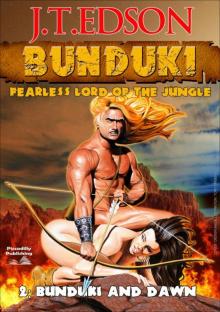 Bunduki and Dawn (A Bunduki Jungle Adventure Book 2)
Bunduki and Dawn (A Bunduki Jungle Adventure Book 2)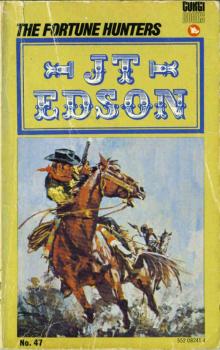 The Fortune Hunters
The Fortune Hunters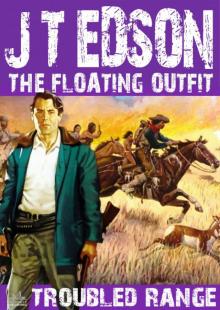 The Floating Outfit 12
The Floating Outfit 12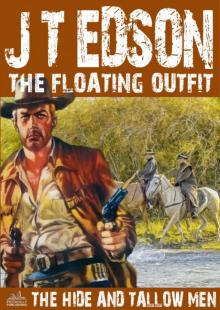 The Hide and Tallow Men (A Floating Outfit Western. Book 7)
The Hide and Tallow Men (A Floating Outfit Western. Book 7)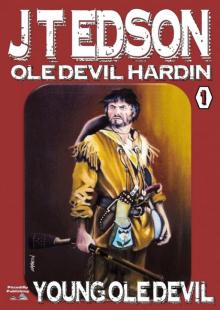 Young Ole Devil
Young Ole Devil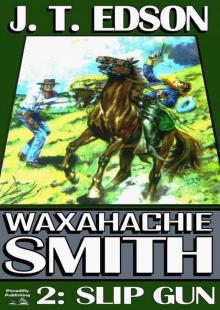 Slip Gun
Slip Gun The Drifter
The Drifter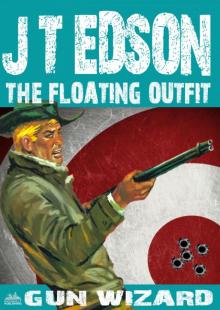 The Floating Outfit 45
The Floating Outfit 45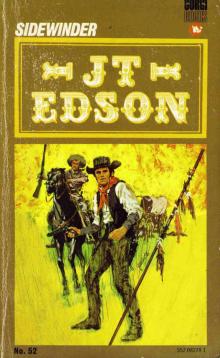 Sidewinder
Sidewinder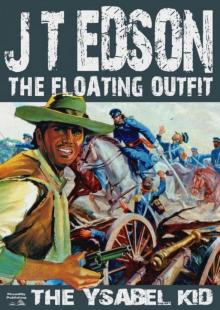 The Ysabel Kid
The Ysabel Kid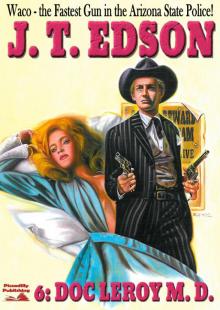 Waco 6
Waco 6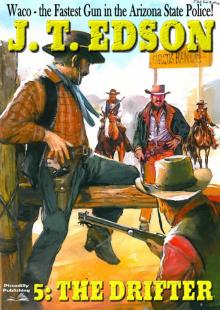 Waco 5
Waco 5 Point of Contact
Point of Contact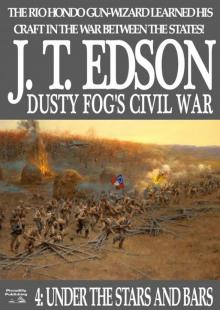 Under the Stars and Bars (A Dusty Fog Civil War Western Book 4)
Under the Stars and Bars (A Dusty Fog Civil War Western Book 4)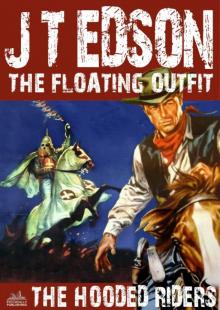 The Floating Outfit 9
The Floating Outfit 9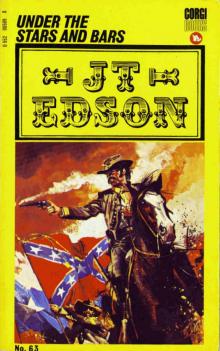 Under the Stars and Bars
Under the Stars and Bars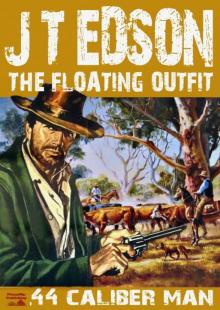 .44 Caliber Man
.44 Caliber Man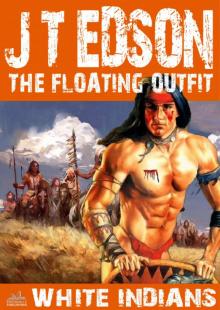 The Floating Outfit 17
The Floating Outfit 17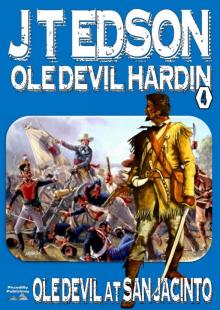 Ole Devil at San Jacinto (Old Devil Hardin Western Book 4)
Ole Devil at San Jacinto (Old Devil Hardin Western Book 4)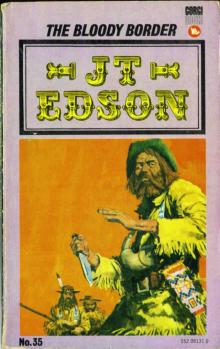 The Bloody Border
The Bloody Border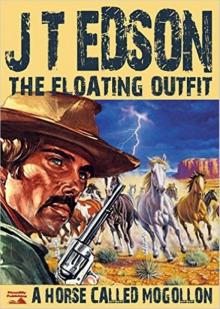 A Horse Called Mogollon (Floating Outfit Book 3)
A Horse Called Mogollon (Floating Outfit Book 3)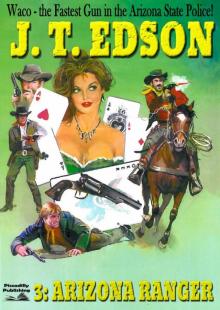 Waco 3
Waco 3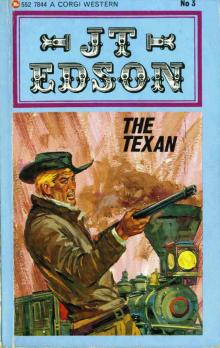 The Texan
The Texan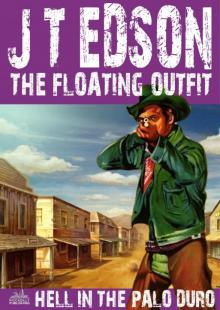 The Floating Outfit 35
The Floating Outfit 35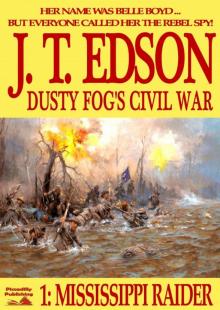 Mississippi Raider
Mississippi Raider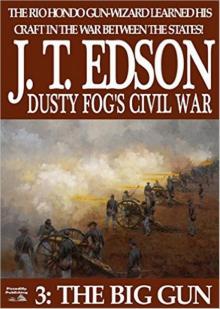 The Big Gun (Dusty Fog's Civil War Book 3)
The Big Gun (Dusty Fog's Civil War Book 3)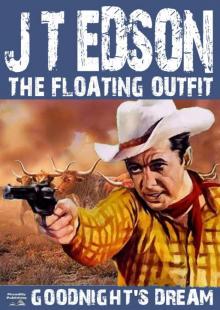 Goodnight's Dream (A Floating Outfit Western Book 4)
Goodnight's Dream (A Floating Outfit Western Book 4) Waco 4
Waco 4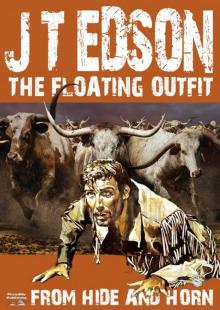 From Hide and Horn (A Floating Outfit Book Number 5)
From Hide and Horn (A Floating Outfit Book Number 5)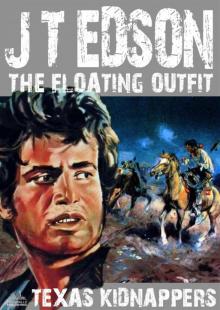 The Floating Outfit 18
The Floating Outfit 18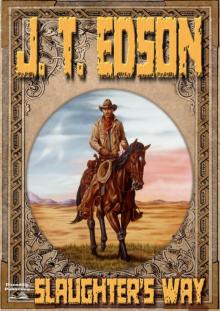 Slaughter's Way (A J.T. Edson Western)
Slaughter's Way (A J.T. Edson Western)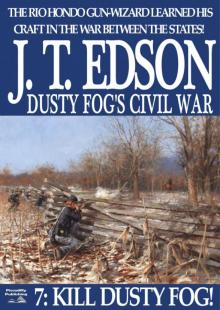 Dusty Fog's Civil War 7
Dusty Fog's Civil War 7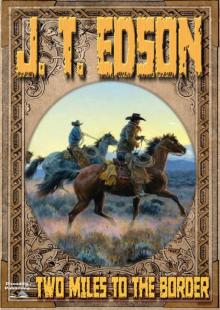 Two Miles to the Border (A J.T. Edson Western)
Two Miles to the Border (A J.T. Edson Western)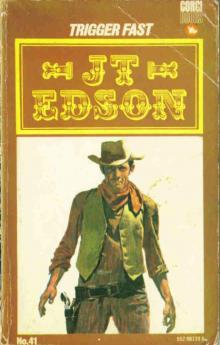 Trigger Fast
Trigger Fast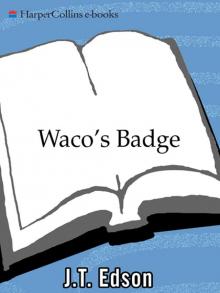 Waco's Badge
Waco's Badge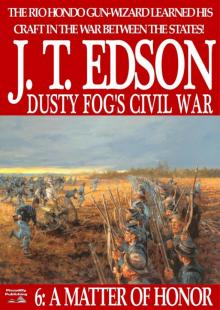 A Matter of Honor (Dusty Fog Civil War Book 6)
A Matter of Honor (Dusty Fog Civil War Book 6)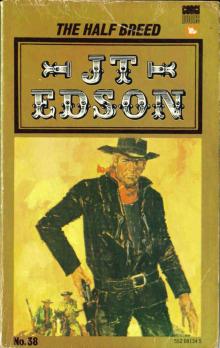 The Half Breed
The Half Breed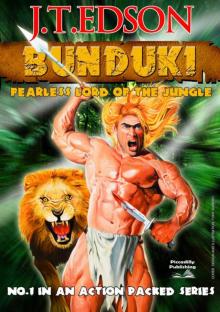 Bunduki (Bunduki Series Book One)
Bunduki (Bunduki Series Book One)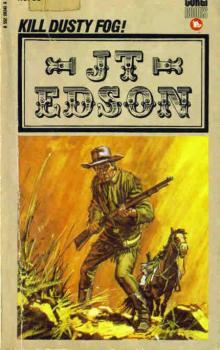 Kill Dusty Fog
Kill Dusty Fog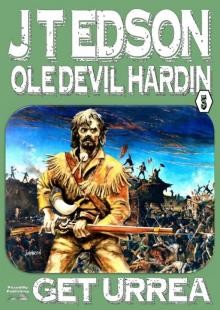 Get Urrea! (An Ole Devil Hardin Western Book 5)
Get Urrea! (An Ole Devil Hardin Western Book 5)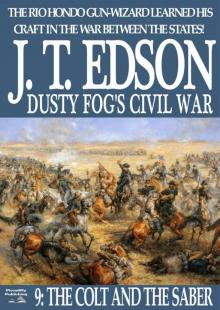 Dusty Fog's Civil War 9
Dusty Fog's Civil War 9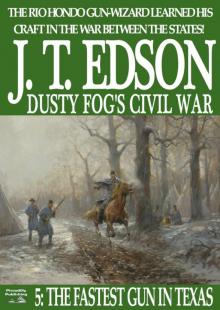 The Fastest Gun in Texas (A Dusty Fog Civil War Book 5)
The Fastest Gun in Texas (A Dusty Fog Civil War Book 5)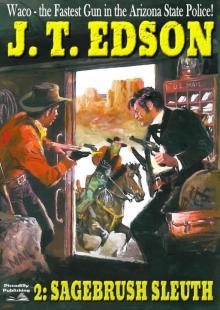 Sagebrush Sleuth (A Waco Western #2)
Sagebrush Sleuth (A Waco Western #2)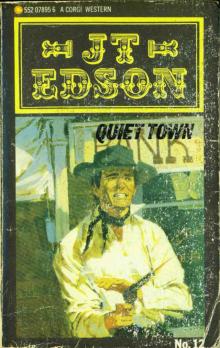 Quiet Town
Quiet Town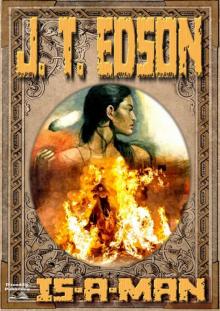 Is-A-Man (A J.T. Edson Standalone Western)
Is-A-Man (A J.T. Edson Standalone Western)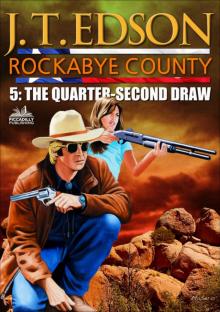 Rockabye County 5
Rockabye County 5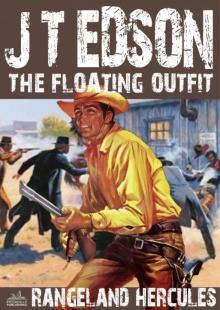 The Floating Outfit 14
The Floating Outfit 14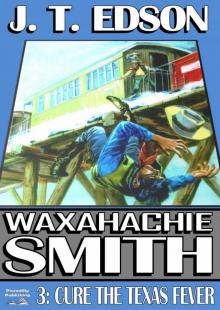 Cure the Texas Fever (A Waxahachie Smith Western--Book 3)
Cure the Texas Fever (A Waxahachie Smith Western--Book 3)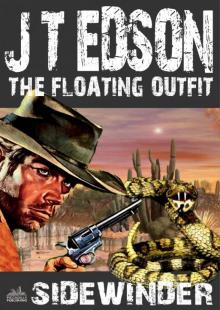 The Floating Outfit 13
The Floating Outfit 13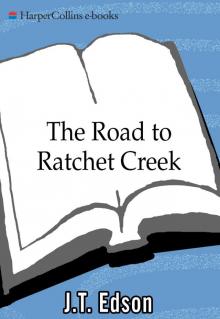 The Road to Ratchet Creek
The Road to Ratchet Creek